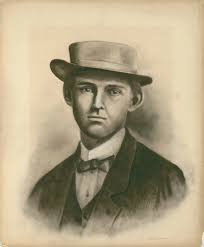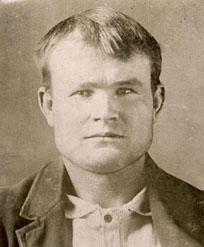Jessie James

Jesse James sat quietly astride his restless horse, gazing toward the horizon. It was late autumn, 1879, and the colors of the trees mirrored the fiery hues of the fading sunset. Jesse's sharp, steady eyes watched the shadows lengthening across the Missouri plains as he considered his next move. Behind him, Frank James, his older brother and partner-in-crime, quietly loaded his pistol, ever vigilant and prepared.
The James brothers were notorious figures in the folklore of the West, romanticized by some, vilified by others. For Jesse, however, the label "outlaw" never quite captured the complexity of the man beneath. He saw himself as a rebel, resisting a corrupt government and avenging the injustices done to his family during and after the bitter years of the Civil War.
Frank approached Jesse slowly, handing him a worn and folded piece of paper.
"What's this?" Jesse asked, eyebrows furrowing.
"Telegram came this morning," Frank said solemnly. "The Pinkertons are on our trail again."
Jesse sighed heavily. Allan Pinkerton's men had been relentless, their pursuit fueled by Jesse's continued raids on trains and banks across Missouri, Kansas, and Kentucky. Jesse unfolded the telegram, his eyes scanning quickly. A grim smirk played briefly on his lips.
"Well, let 'em come," Jesse said defiantly. "We've outsmarted 'em before."
They had indeed, through clever disguises, well-chosen hideouts, and careful alliances with trusted local farmers and merchants sympathetic to their cause. Jesse's charm, combined with Frank's steady pragmatism, made them an effective duo.
But tonight, Jesse felt a strange heaviness he couldn't shake, an ominous intuition that troubled his otherwise confident demeanor.
"Frank," he said quietly, after a long silence, "sometimes I wonder if our luck ain't runnin' thin."
Frank looked at his younger brother, the worry visible in his hardened eyes. "Luck's what we make it, Jess," he replied calmly. "We ain't got the luxury to stop and think otherwise."
They rode in silence for a time, the rhythmic clip of their horses' hooves marking the passage toward their hidden camp. Nestled deep within the wooded hills of Missouri, their makeshift home offered a brief sanctuary from the relentless pressures of outlaw life. As they entered the clearing, familiar faces emerged from the shadows—trusted companions who'd ridden alongside Jesse and Frank through countless robberies and narrow escapes.
That evening, seated around a small fire, Jesse gazed thoughtfully into the flames. The conversation turned, as it often did, to their next heist. A bank in Northfield, Minnesota, promised a substantial payoff but was far outside their usual territory.
"Minnesota's a gamble," one of the men warned cautiously. "Folks up there ain't sympathetic like they are here."
Jesse considered this carefully. Deep down, he knew the man was right. Still, the restless drive that had shaped his life wouldn't allow him to back down.
"We go," Jesse decided firmly. "We've taken bigger risks before."
Preparations for the raid began swiftly, plans laid meticulously as always. But beneath the confident exterior Jesse projected, his doubts lingered.
Days later, riding north under a cloak of night, Jesse turned to Frank. "Think this is it?" Jesse asked softly, his voice betraying a rare vulnerability.
Frank hesitated, then shook his head. "I don't rightly know," he admitted. "But we'll ride together, come what may."
The Northfield raid, however, proved disastrous. The townspeople resisted fiercely, and gunfire erupted almost immediately. Chaos reigned as the James gang scattered in panic. Jesse barely escaped, wounded and deeply shaken. The raid marked the beginning of the end for Jesse James, as relentless pursuit intensified, isolating him and gradually wearing down his spirit.
In the following months, Jesse's trust eroded, and paranoia set in. He felt trapped, hunted, and betrayed even by those closest to him. Ultimately, it was a betrayal from within that sealed Jesse's fate.
In April 1882, Jesse James stood in his rented home in St. Joseph, Missouri, inspecting a dusty picture hanging askew on the wall. Behind him stood Robert Ford, a man Jesse believed to be a trusted ally. Jesse never saw the gun Ford aimed at his back.
The shot echoed, reverberating beyond the small house into history itself. Jesse James, infamous outlaw and symbol of a turbulent era, fell silently to the ground, his legend permanently etched into the annals of the Wild West.
Though his deeds had been violent, Jesse's death transformed him into a folk hero to many. Songs were sung, stories told, and myths born about a man who had defied authorities and challenged the powerful.
In death, Jesse James became larger than life, immortalized as the embodiment of freedom, rebellion, and the fierce, untamed spirit of the American West.









